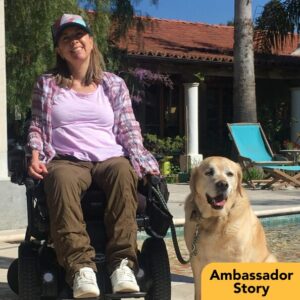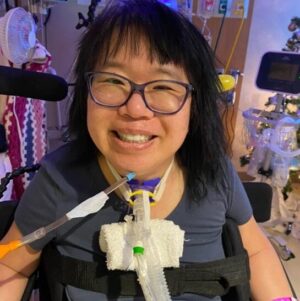My name is Jane Koza. I am 58 years old. I went from being a healthy adult to living in a nursing home by age 50. This is my story.
I was an all-star athlete in my youth, playing basketball and softball competitively. During my senior year of high school, we won the state championship in softball and basketball. I loved the experience of being on a team. Those great memories laid the groundwork for continuing athletics in college.

Jane was athletic and active in her youth
In 2005 when I was in my 40s, I learned that I needed knee surgery to walk comfortably. The knee surgery did not go as planned, and I contracted MRSA, which led to a second surgery for a total knee replacement—my knee joint had to be entirely removed.
After the second surgery, I slipped into a coma due to the infection. I went into a grand mal seizure and arthritic septic shock, resulting in a second infection. The infection traveled to my spine and left me with transverse myelitis, which resulted in paralysis from my chest down.
By April 2006, I was living a nursing home. I hadn’t even turned 50 years old yet.

Jane with one of her best friends, Stanley, in the nursing home
The transition was hard psychologically. You have to come to grips with the fact that you will never walk again. You expect to face medical challenges when you are in your 70s or 80s, not when you are in your 40s. It was also difficult to accept the fact that the best place for me to be would be in a nursing home where I could receive round-the-clock care as needed, including continual social and physical support.
I am different from the other residents here at the nursing home. I am still very young and active compared to most of the other residents. I still enjoy going to concerts, shopping, and visiting with friends outside of the nursing home, regularly.

Jane, pictured with her sister, is younger and more active than most other residents
It was extremely important to me to find independence and avoid being bedridden once I realized that I would be living in a nursing home. I also had to find a way to cover some of the medical expenses associated with my new life, including:
- A wheelchair with greater flexibility and movement than the geriatric medical chair provided by the nursing home;
- Special wheelchair cushions that reduce painful pressure sores, which are not covered at all by insurance;
- Physical therapy so I can learn to transfer myself from my wheelchair to a bed or seat, and gain more self-sufficiency so I can someday leave this nursing facility;
- Daily essentials like drainage bags, backpacks, cup holders, and adaptive equipment

Jane was overjoyed to meet her first Help Hope Live fundraising goal
These things can improve my quality of life and are just one part of what makes life worth living.
Even having the same caregiver day-to-day can improve your life when you are living with an illness like transverse myelitis. I will also encounter additional expenses in the future, so I am setting my sights on fundraising to offset the cost of a power chair, a private caregiver or aide, and more advanced physical therapy programs. These expenses can make a difference to my level of independence in the future. They would have a profound effect on my life.

Jane creates unique tree of life coloring pictures in exchange for donations
When my priority was to get a better chair than what was provided by the nursing home, I began fundraising with Help Hope Live for the Mid-Atlantic Catastrophic Illness Fund in 2015.
My beloved high school, Mother Seton, learned about my fundraising efforts and really came through to help me. The alumni association was instrumental in helping me reach my first fundraising goal. I couldn’t have done it without them. With their help, I was able to reach my goal and get the wheelchair I had been waiting for.

Jane’s former high school has helped her to fundraise
Help Hope Live has made a huge difference in my life, both in connecting me with old friends who can support me and in helping me monetarily offset the out-of-pocket medical expenses I could not afford alone. For that, I am eternally grateful.
To me, hope means that things can be better than they are today in the future.

Jane calls herself a “true survivor” navigating life with transverse myelitis
Jane Koza fundraises for the Mid-Atlantic Catastrophic Illness Fund. Click or tap here to read more stories about how mobility can change lives.
My name is Jane Koza. I am 58 years old. I went from being a healthy adult to living in a nursing home by age 50. This is my story.
I was an all-star athlete in my youth, playing basketball and softball competitively. During my senior year of high school, we won the state championship in softball and basketball. I loved the experience of being on a team. Those great memories laid the groundwork for continuing athletics in college.

In 2005 when I was in my 40s, I learned that I needed knee surgery to walk comfortably. The knee surgery did not go as planned, and I contracted MRSA, which led to a second surgery for a total knee replacement—my knee joint had to be entirely removed.
After the second surgery, I slipped into a coma due to the infection. I went into a grand mal seizure and arthritic septic shock, resulting in a second infection. The infection traveled to my spine and left me with transverse myelitis, which resulted in paralysis from my chest down.
By April 2006, I was living a nursing home. I hadn’t even turned 50 years old yet.

The transition was hard psychologically. You have to come to grips with the fact that you will never walk again. You expect to face medical challenges when you are in your 70s or 80s, not when you are in your 40s. It was also difficult to accept the fact that the best place for me to be would be in a nursing home where I could receive round-the-clock care as needed, including continual social and physical support.
I am different from the other residents here at the nursing home. I am still very young and active compared to most of the other residents. I still enjoy going to concerts, shopping, and visiting with friends outside of the nursing home, regularly.

It was extremely important to me to find independence and avoid being bedridden once I realized that I would be living in a nursing home. I also had to find a way to cover some of the medical expenses associated with my new life, including:
- A wheelchair with greater flexibility and movement than the geriatric medical chair provided by the nursing home;
- Special wheelchair cushions that reduce painful pressure sores, which are not covered at all by insurance;
- Physical therapy so I can learn to transfer myself from my wheelchair to a bed or seat, and gain more self-sufficiency so I can someday leave this nursing facility;
- Daily essentials like drainage bags, backpacks, cup holders, and adaptive equipment

These things can improve my quality of life and are just one part of what makes life worth living.
Even having the same caregiver day-to-day can improve your life when you are living with an illness like transverse myelitis. I will also encounter additional expenses in the future, so I am setting my sights on fundraising to offset the cost of a power chair, a private caregiver or aide, and more advanced physical therapy programs. These expenses can make a difference to my level of independence in the future. They would have a profound effect on my life.

When my priority was to get a better chair than what was provided by the nursing home, I began fundraising with Help Hope Live for the Mid-Atlantic Catastrophic Illness Fund in 2015.
My beloved high school, Mother Seton, learned about my fundraising efforts and really came through to help me. The alumni association was instrumental in helping me reach my first fundraising goal. I couldn’t have done it without them. With their help, I was able to reach my goal and get the wheelchair I had been waiting for.

Help Hope Live has made a huge difference in my life, both in connecting me with old friends who can support me and in helping me monetarily offset the out-of-pocket medical expenses I could not afford alone. For that, I am eternally grateful.
To me, hope means that things can be better than they are today in the future.

Jane Koza fundraises for the Mid-Atlantic Catastrophic Illness Fund. Click or tap here to read more stories about how mobility can change lives.











